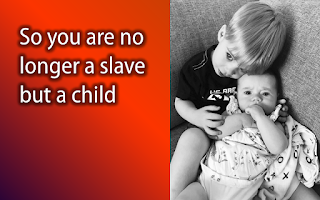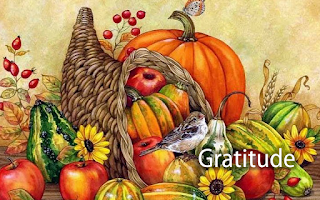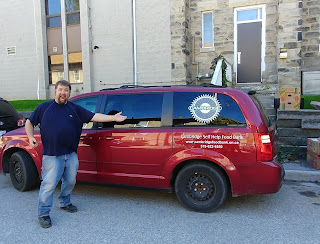Senior’s Christmas Tea
Continue reading »So you are no longer a slave but a child
Hespeler, 28 October, 2018 © Scott McAndless – Baptism
Galatians 3:23-4:7, Psalm 78:1-8, Mark 9:33-37
| O |
ne day, when his disciples were being kind of awful with each other – when they were arguing and fighting with each other because this one thought that he knew exactly how things ought to be done and was frustrated that no one else would listen to him and that one thought that the other guy over there wasn’t giving him the respect he deserved and then there was this other one who totally hated all of the songs that the other guys would sing when they walked down the road – anyways I don’t really want to get into it but they were being kind of typical for them honestly and so Jesus decided to do something that would help them to see what was really important about what it was that they were doing together.
So this is what Jesus did. He said to the disciples, hang on for a minute guys because I need to show you something. And he went over to a place by the side of the road where there were some women sitting and talking together and they were holding their babies. And Jesus said to one of them, “Please, ma’am, could I borrow your beautiful child for but a moment? In fact, if you would share her with me it would really help me to set these disciples of mine straight.”
The mother looked at Jesus for a moment and decided that he looked trustworthy enough and she let him take the child gently into his arms. And then Jesus carried that child back to the circle of disciples and sat down in their midst with the child upon his knees and said to them, “Guys, do you see this here? This is what it is all about.”
And I kind of feel that that is what Jesus has done for us today. Jesus spoke to Mark and to Dina and he said to them, “Say, would you bring your two beautiful children, Jackson and Amelia, and would you share them with my church in Hespeler for about an hour today? And, praise God, Mark and Dina said yes.
I know that they think that they brought their children here in order that they might be baptized today. And indeed they did. But I have no question that Jesus also had an ulterior motive and making sure they can come here today. Jesus wanted to make sure they came here so that they might teach the gospel, the good news, to us.
So, if Jesus has gone to all that trouble to communicate with us today, I think that we ought to listen. But we are kind of in the position that those disciples were in on that day when Jesus plunked a child down in their midst. They probably looked at each other and shrugged and said, “I don’t think I get it.” And the message may not be so obvious to us either. So let me suggest we turn to the Apostle Paul, that explainer of all things, because he may be able to help us.
In our reading this morning from his letter to the Galatians, Paul is speaking to a church that is struggling with the same kind of problems that the disciples were having on that walk with Jesus. They were trying to figure out who should be in charge of the church and how things should be done. They were arguing over whose concerns were more important and whose were less. And Paul, in this letter, does the same thing for them that Jesus did for the disciples; he invites them to consider some children.
The thing is, though, that most of what Paul says is expressed in terms of the normal child-rearing practices of that time and we can’t quite relate to those things. For example, in Paul’s time, children were often raised by a slave who was called a disciplinarian and who was given the authority to actually beat the children, so Paul talks about how children had to deal with that figure in their lives. There were also some pretty strict regulations about inheritance and Paul makes reference to those. But, as I say, those things don’t really have much to do with our experience so I don’t want to get into explaining them.
Nevertheless, the overall point that Paul is making is really important and helpful to us so I wanted to try and find a different way to approach it. So, rather than talking about what ancient children had to live through, let me do what Jesus did and invite you to consider the child or children in front of you. Let’s consider what Jackson and Amelia can teach us about the good news of Jesus Christ.
Jackson and Amelia are very young and yet they are Canadian citizens. They are free citizens of a democratic society with all of the rights and privileges that come with such citizenship. We have also welcomed them today into the Church of Jesus Christ through the sacrament of baptism and they have full rights and responsibilities within the church should they choose to exercise them. Nevertheless, over the next few years, how much freedom will Jackson and Amelia practically enjoy? Not a lot. I am pretty sure that there are going to be rules, lots of rules, that they have to live by. There will be rules like, “Hold my hand when you cross the street,” “Brush your teeth before you go to bed,” and, “Never, never, never touch a hot stove.”
Why will those rules be there? They will be there because their parents love them and don’t want bad things happen to them – things like tooth decay and burnt fingers.” Those rules will come out of love, but will the children always hear them that way? If they are like most children, probably not. Most children don’t really like rules, probably because they often feel arbitrary and they don’t understand that they are coming from love. But the idea is that, as these children grow up, they will begin to look beyond the rules and understand the love behind them and internalize the reasons for the rules in productive ways.
Of course, it doesn’t always quite work out like that. Sometimes children never understand the purpose behind the rules and instead just slavishly continue to follow them without understanding. Let me give you an example I heard about recently. One thing that sociologists have been noticing about young people coming of age in recent years in our society is that many of them seem to have an irrational fear of handling raw meat. They almost can’t touch it. This is something that can certainly get in the way of mature adults learning to cook for themselves! As a result, researchers are actually working on developing packaging for meat that eliminates the need to actually touch the meat to cook it. But where did this irrational fear come from?
It comes from the rules were given to them as young children. It is a good rule to not allow small children to handle raw meat because the danger that they will get bacteria in their mouths or noses is too great. It is a good rule for a small child not to handle raw meat, but as that child grows older that rule is supposed to pass away as they learn to understand what the actual dangers of raw meat are and how to safely deal with those dangers. That learning sets them free from the old rules to explore their freedom by cooking many different things. But if the child doesn’t grow beyond the simple rule-based understanding, they will never know that freedom and that is what seems to be happening.
And, as it is with that one particular rule, so it is with many of the rules that we grew up with. The point behind them is not simple obedience. The point is to understand their purpose in the love that is behind them. This is something that the Apostle Paul clearly understood when he said, “Love is the fulfillment of the law.” (Romans 13:10) This is something that these children will have to learn as they mature to adulthood or they will never know the true freedom that they were born to inherit. They will simply be slaves to obedience.
Another thing that sometimes happens with children as they grow older is that they may become confused about why their parents love them. Now, I have absolutely no doubt that Jackson and Amelia’s parents love them because they love them. They don’t love them based on how well they follow the various rules of the household. But sometimes that message gets confused and children start to think that they can only earn their parents’ love and approval by obedience and by living up to their parents’ expectations.
This also is a misunderstanding of the purpose of the rules. And, unfortunately, many adults carry that misunderstanding with them all through their lives. They continue to think that they must earn love, approval and meaning by how well they live up to the expectations of others. They often especially assume this in their relationship with God. This error also leads to unnecessary and often debilitating guilt when we feel like we don’t measure up.
Does that teach us something about our Christian lives? Absolutely! The Bible is just full of laws, rules and commandments. This is true both of the Old Testament and New. These are all expectations that are placed upon us. And it is quite possible, indeed, I would say very common, for Christians to become fixed upon those expectations and to think that it is by living up to them that will become acceptable to God. But that is the understanding of a child – a child who may not know where those expectations come from. Like with Jackson and Amelia’s parents, those expectations come out of love – out of God’s love for us and God’s desire to protect us from what is bad for us. When we fail to understand that, all we are left with is obedience. We think that we can please God by being good enough and we never succeed.
That’s why Jesus came, by the way. Jesus came to show us what was really behind all that God had done and said – that God only acted out of love and only sought love in return from us. Jesus gave us such a powerful demonstration of the length and the heights and the depths of God’s love that he was willing to give his own life that we might know what God’s love actually looked like. The gospel teaches us that our relationship with God is based on love, not rules. Reflecting on these children reminds us of that truth.
So there clearly is something that Jackson and Amelia can teach us about our Christian lives today. But I don’t think we’re quite done yet. Jesus specifically brought that child among the disciples to speak to them about how they were struggling with each other about who was the greatest – about who should get their way and who mattered most. How can these children help us to get past those kinds of concerns that, honestly, still plague the church to this very day? Well, our prayer for these children today is that they grow up to be strong individuals who know who they are and therefore don’t need to put other people down in order to feel good about themselves. That is who we are all called to be, in Christ.
But they will grow up in a world that doesn’t operate that way – a world where people often feel superior to others because of differences like race or gender or status. That is because people have misunderstood the reason behind the rules. They know they are not good enough in themselves and they therefore think that the only way they can be acceptable is by putting down other people. At the very extreme end of that, we have people walking into places like synagogues and opening fire. We don’t go to such extremes in the church, but we do sometimes have a bad habit of putting people down over differences, just like the disciples did it when they were walking with Jesus.
These children teach us that we don’t need to do that – that because we are in Christ, we don’t need to earn our acceptance by seeming better than others. That is why Paul can write to the church, “As many of you as were baptized into Christ have clothed yourselves with Christ. There is no longer Jew or Greek, there is no longer slave or free, there is no longer male and female; for all of you are one in Christ Jesus.” Old distinctions like race or gender or status, they don’t matter anymore. No one has to be any greater than anyone else to be acceptable to God and so the need to put one another down has disappeared. This also Jackson and Amelia can teach us, it is the gospel of our Lord Jesus Christ in whose name they have been baptized today.
163rd Anniversary Celebration at St. Andrew’s
This coming Sunday, October 21, 2018, St. Andrew's Hespeler will celebrate our 163rd anniversary as a congregation. We will mark this anniversary, as we always do, by celebrating our heritage, but this year we will try to look at that heritage in some new ways and take a look at our connection with the people who inhabited the land before us. We will pray for healing and reconciliation for both indigenous and non-indigenous people in Canada.
We will have some very special guests that will help us to celebrate as we learn and grow. We are very pleased to welcome:
Theresa McGregor: Drum and Song carrier, Moon Bundle, Earth and Water Protector and Traditional Women’s Dancer
Mino Ode Kwewak N’gamowak (Good Hearted Women Singers) will sing and dance with Theresa.
Sasha Sky & Shannon Pride of the White Owl Native Ancestry Association who work to bring healing to aboriginal people and others.
After worship at 10 am, the celebration will continue downstairs in the Fellowship Hall.
A Potluck Lunch will follow at 11:30. Please plan to bring a dish to share. All are welcome.
The Blanket Exercise which will follow the lunch at noon. The Blanket Exercise is a moving experience that has helped many people understand how aboriginal people have experienced our common history. It will be led by Sasha Sky and Shannon Pride
Continue reading »
We will have some very special guests that will help us to celebrate as we learn and grow. We are very pleased to welcome:
Theresa McGregor: Drum and Song carrier, Moon Bundle, Earth and Water Protector and Traditional Women’s Dancer
Mino Ode Kwewak N’gamowak (Good Hearted Women Singers) will sing and dance with Theresa.
Sasha Sky & Shannon Pride of the White Owl Native Ancestry Association who work to bring healing to aboriginal people and others.
After worship at 10 am, the celebration will continue downstairs in the Fellowship Hall.
A Potluck Lunch will follow at 11:30. Please plan to bring a dish to share. All are welcome.
The Blanket Exercise which will follow the lunch at noon. The Blanket Exercise is a moving experience that has helped many people understand how aboriginal people have experienced our common history. It will be led by Sasha Sky and Shannon Pride
Addendum to yesterdays notification Administrative volunteers
On October 15 I posted an invitation to help out with office administration from October to December.
In a single day we have had volunteers vouch for almost all the Mondays and Wednesdays in the schedule...WOW
That leaves the following shifts to fill - see blank days highlighted in light blue.
Administrative volunteer positions available
Effective October 19, 2018 Jan Bancarz will resign as Administrative Assistant.
The Session of St. Andrews has instructed the Human Resources committee to find a suitable replacement. This will take some time to accomplish.
Session has implemented a temporary volunteer schedule to have support in the office and complete administrative tasks in the interim.This volunteer schedule will run from October 22 until December 31, 2018 or an Administrative Assistant is found.
Your help in filling the schedule will ensure we have people to respond to visitors and maintain our open-door policy. On Mondays, Wednesdays and Fridays 3-hour shifts are available for volunteering. Taking a day or a few days will allow us to keep the office open to the public.
THANK YOU
Please contact Rob Hodgson or Rev. Scott McAndless for volunteering or more information on this program.
| Date |
| 22-Oct |
| 24-Oct |
| 26-Oct |
| 29-Oct |
| 31-Oct |
| Date |
| 2-Nov |
| 5-Nov |
| 7-Nov |
| 9-Nov |
| 12-Nov |
| 14-Nov |
| 16-Nov |
| 19-Nov |
| 21-Nov |
| 23-Nov |
| 26-Nov |
| 28-Nov |
| 30-Nov |
| Date |
| 3-Dec |
| 5-Dec |
| 7-Dec |
| 9-Dec |
| 10-Dec |
| 12-Nov |
| 14-Dec |
| 17-Dec |
| 19-Dec |
| 21-Dec |
| 24-Dec |
| 27-Dec |
| 31-Dec |
When “Fanboys” Change their Minds
Hespeler, 14 October, 2018 © Scott McAndless
John 20:19-29, Acts 20:7-12, Psalm 16:1-11
| I |
f there is one thing you need to know about Simon, it is this. He loves Apple. I’m not talking about the fruit here; I’m talking about the company. Simon doesn’t just like Apple products, Simon doesn’t just exclusively use Apple products. Apple products give meaning to his entire life.
I mean, you probably know some people who always have the latest and greatest model of the iPhone®, who you never see without the ends of Apple Earpods® hanging out of their ears, who do all of their work on a Macbook Pro®, read and create with an iPad® and an Apple Pencil®, but I’m not just talking about that. For Simon that is only the beginning. He does that almost without having to think about it.
No, Simon goes out of his way to make sure that every part of his life bears the Apple logo on it. His entire home is run by his HomePod®. Any appliance that is not able to connect to it is not the kind of appliance that Simon wants to have. Any television show that is not available on AppleTV® is a show that Simon doesn’t need to watch. Simon doesn’t have a life, he has iLife® and that is good enough for him. That’s Simon. If you know that about Simon, you will know everything there is to know. You will know how he will react in every situation because he will do whatever Siri® tells him to do. He once drove into a ditch because Apple Maps® told him to.
Do you know a Simon? I have known a few. And if you don’t know someone who is that big of a fan of Apple products, maybe you know a fan of some other brand: Honda, Nike or maybe Tim Hortons. So, if you don’t know Simon, just imagine for a moment that you do. Can you see him there – wearing his Apple Watch®, Think Different® t-shirt, sporting a tattoo of an apple with one bite out of it? You know the type.
So let’s say you know a Simon. You know that Apple is the organizing principle of his life until one day it isn’t. Yes, one day Simon comes along holding an Android phone and tells you that he is now Android all the way. What would you think? Wouldn’t you assume that something serious – maybe even earth shattering – had happened in Simon’s life to make such a radical change? You might not know what, of course. Maybe he had his iPhone® explode in his hand or maybe he had an Android phone literally save his life. You might not know what, but you would know with certainty that something undeniable had happened.
Okay, now consider this. You have eleven guys – just them and a few of their friends – that you have always known one thing about. Most of the time they are pretty normal people. They work, they play, they eat with a few strange habits but they are just regular folks. But there is this one odd thing about them. One day a week they treat completely differently.
I’m not just saying that they take that day off (which is in itself a pretty extraordinary thing in our 24 hour seven days a week world). It’s that that day is completely different for them. They won’t do anything. If the fire goes out in their house, they won’t even relight it. They get on an elevator that day, and they won’t even press the button to say which floor they want to get off on. They are just freakishly strange about this day, so much so that the way that they keep that day gives meaning and definition to their entire week. You might even say that the way they keep that day gives definition and meaning to their entire life. That is how significant it is to them. That day of the week, by the way, is Saturday.
And then, one day, you run into them and everything has changed. All of a sudden, they don’t care about Saturday at all. It is just another day for them. All of a sudden it’s all about Sunday. Sunday is the day that means the world to them and that gives meaning to their entire week and their entire lives. You’ve got to figure that something very important and undeniable happened to them on a Sunday.
That is the quandary we have when we look at the early Christian movement. The early Christian Church, in the years following the death of Jesus, was entirely made up of Jews. And, as Jews, these were people for whom the keeping of the seventh day of the week, Saturday, meant everything. It wasn’t just a day off for them, it was, as I have portrayed, an observance that gave meaning to their entire existence. And yet the evidence clearly indicates that, all of a sudden, all of these Jews just stopped observing the Sabbath. Saturday suddenly meant almost nothing to them. And instead, it was suddenly all about an entirely different day of the week; it was all about Sunday.
People don’t do that, don’t make that kind of radical change, without a very good reason. You have to assume that something happened to them, something very powerful, that made them look at the entire week and at their entire lives in a very different way.
So, the obvious question when you look at the early church is this, what happened? The short answer to that question, as explained in our reading from the Catechism this morning, is the resurrection. Jesus rose from the dead on a Sunday. That is the one thing that changed everything for the church. In fact, I happen to believe that perhaps the greatest evidence we can present for the reality of the resurrection of Jesus is that that is about the only way we can possibly explain why a bunch of Jews would make such a drastic change in their lives. Only something as extraordinary as a resurrection could have convinced them to do that.
But I know how we usually think of that. We think of the resurrection as a one-time event. It only happened on one Sunday, Easter Sunday. But I am not sure that the early Christians experienced it exactly like that.
This morning we read the accounts of three Sundays in the life of the early church. The first Sunday that we read about, in the Gospel of John, was, of course, a story of Easter Sunday. “When it was evening on that day (that is, Easter day), the first day of the week (that is, Sunday), and the doors of the house where the disciples had met were locked for fear of the Jews...” So what we have in this passage is the church, in the form of the disciples gathered together, on a Sunday. And when the church is gathered in this way, they have an experience of the Risen Christ. “Jesus came and stood among them and said, ‘Peace be with you.’”
I realize that you’re going to tell me that there is nothing very extraordinary about that. It’s Easter! Of course the disciples had an experience of the Risen Christ; that’s what Easter is about. But stay with me a moment here because I don’t think the gospel writer is quite done in his explanation of what the church really experienced, because what is the very next thing that he says?
“A week later his disciples were again in the house, and Thomas was with them.”[1] so we jump immediately to the next Sunday, the next meeting of the church, as if nothing significant has happened in the meantime. And, indeed, I think that John is saying that nothing has happened. I think it’s important for John to say that the church next experienced the risen Jesus when they gathered again on a Sunday.
There are other stories of the church meeting with Jesus after his death that happened on Sundays. There’s one at the end of the Gospel of Luke where two disciples are walking along on a Sunday and are joined by a third who explains the scriptures to them and then all three sit down to share a meal and, when the stranger breaks the bread, the others suddenly recognize that the risen Jesus is among them. That also is a description of the early church meeting on a Sunday where two or three are gathered, the scriptures are preached and bread is broken. That gospel writer, Luke, is also saying that this was the regular Sunday experience of the early church.
We read one more story how about the church gathering on Sunday this morning. This one happens many years later as told in the book of Acts, but everything in this story sounds very familiar. It’s Sunday, the church comes together to break bread, and there’s even a preacher there to preach a sermon. In fact, in a way that no doubt resonates with many Christians down through the centuries, there is a preacher who has a tendency to preach a little bit long. I mean, I’m sure that nobody in the entire history of this church has ever thought the sermon was too long so maybe you can’t relate to that, but I have heard that many Christians do think that sometimes. So we have it all, a Sunday gathering, breaking bread or communion, and a really, really long sermon. It is a stereotypical Sunday church meeting that Christians from down through the ages would recognize.
But there is one truly extraordinary element in this Sunday meeting as told in the Book of Acts. It happens when Eutychus falls asleep while Paul drones on and on. He plunges from the third-story window apparently to his death. What is important about that story? Is it just another great miracle story among many miracle stories in the book of Acts? No, I think there’s something special about this one because it happens when the church is gathered on Sunday.
The writer tells his story very carefully at this point. He doesn’t say that Eutychus is actually dead, merely that everyone thinks that he’s dead. And when Paul comes along he doesn’t explicitly say that Paul raises the dead boy to life. It could be that Paul is saying that the others are merely mistaken in thinking that the boy is dead. The author avoids saying in so many words that it is a resurrection miracle, but he certainly gets across the point that the church experienced it as a miracle. The emphasis is certainly on their experience and feelings in the last phrase, “Meanwhile they had taken the boy away alive and were not a little comforted.”
I think that this is the author’s way of saying that, even many years after the first Easter, the church was still experiencing the power and reality of the resurrection of Jesus when they gathered on Sundays – in this case, of course, experiencing it very practically in the salvation of Eutychus.
I’m not saying that it happened so dramatically every week, of course, but I would say that the New Testament writers are in agreement that the experience of the risen Christ was not just limited to one Sunday or just to a short period of time. It was something that kept on happening over and over again each Sunday as the church continued to meet, to pray, to listen to scriptures and break bread, they discovered the risen Jesus among them in many ways.
It didn’t only happen on Sundays, of course. I have no doubt that there were some pretty amazing experiences that happened on other days of the week. But it was on Sundays, when they gathered, that it happened most consistently and reliably for the early church. And that is the only thing that can really explain how a bunch of Saturday fanboys were willing to change everything that they had ever been and had ever told them who they were to suddenly start treating Sunday like it was the only day that truly mattered.
But here’s is the thing: it doesn’t just need to be them. Our Lord Jesus Christ, crucified by Pilate so long ago, is nevertheless still just as alive today as he was for the early church. If they consistently experienced the power of his resurrection week after week when they gathered, then why wouldn’t we? The bottom line is that there is no reason why we shouldn’t. Indeed, I know that it still happens sometimes. I have experienced it myself and I have heard of the experiences of many others. Such experiences are a gift of God, come in many forms, and they are received (like all of God’s gifts) by faith. There is no reason why you should not be able to have such an experience of the risen Jesus.
In fact, I would suggest that the main reason why it doesn’t happen more is because we have largely convinced ourselves not to expect it. In our stubbornness, we have closed ourselves off from the experience by the ways in which we are always rationalizing everything, focusing on the negative and trying to keep control of everything. But just think if you, like those early Christians, were to approach each Sunday with an overwhelming expectation – if you were to walk into church each week not knowing where you would find the risen Jesus (perhaps in a reading or in a word that was shared, perhaps in a beautiful piece of music, in the face of your neighbour, perhaps even in a piece of bread and a cup of wine), but knowing that he would be there for you. Maybe you would also learn the true meaning of Sunday.
[1] Some translations here have “Eight days later.” It is true that that is what the original Greek text says, but, in the context, the first Sunday seems to be counted as the first day, eight days later would mean the next Sunday. I believe this translation is correct.
Sermon Video:
An Opportunity to Experience the Blanket Excercise
Please join us on Sunday, October 21, 2018 at noon for
The Blanket Exercise is a workshop that explores the nation-to-nation relationship between Indigenous and non-Indigenous peoples in Canada. Its goal is to build understanding about our shared history by walking through pre-contact, treaty-making, colonization, resistance and reconciliation. Participants will also be able to smudge before and after (if they wish) and participate in a discussion around what the exercise was like for them.
Our special guests to assist us in this workshop will be Sasha Sky and Shannon Pride of the White Owl Native Ancestry Association.
All are welcome to come and participate in this moving event. Join us at St. Andrew’s Hespeler, 73 Queen St. E., Cambridge, ON in the Lower Fellowship Hall.
Join in a Pot Luck Lunch 11:15 am if you wish.
Children are invited to “Explorations in Music” which will include playing and making instruments during the Blanket Exercise.
Hosted by St. Andrew’s Hespeler (standrewshespeler.ca) with the White Owl Native Ancestry Association (wonaa.ca)
Gratitude
Hespeler, 7 October, 2018 © Scott McAndless Communion, Thanksgiving
Genesis 1:27-2:3, Matthew 12:1-14, Psalm 92:1-15
| I |
t was late on the sixth day when the Lord God turned to the newly created humanity and said unto them, “Be fruitful and multiply, and fill the earth and subdue it; and have dominion over the fish of the sea and over the birds of the air and over every living thing that moves upon the earth.” And the Lord God said to Godself, since this responsibility for the Earth has now been passed on to the humans, then I declare that this work of creation is finished. What more do I need to do? The humans can be in charge. I’m sure that will all work out fine. Thus the heavens and the earth were finished, and all their multitude.
And very truly did humanity hear that command and they said one unto another, “Okay, you heard the Creator, we’ve got some work to do! There is a whole world out there to have dominion over and that adds up to a whole lot of filling and subduing. And yes it will be hard but we will subdue the land itself and break it with the plow and the shovel and the backhoe so that we might have dominion over it. We will make the earth produce food and great wealth in precious stones and metals and we will make the land itself a great treasure – real estate, we will call it – and it will become so valuable that it will produce millionaires and even billionaires.
In the same way we wi ll exercise our dominion over the beasts of the earth, we will take them and make them to work for us and we will breed them for our food. We will exercise our dominion over the seas by extending great nets to sweep up all of the fish, we will dig out harbours for trade and pour all of the waste we produce along the way into the waves even until a giant garbage patch of floating plastic forms in the Pacific Ocean.
And our dominion over the air? Well, that might take some time, but eventually we will build great machines that will enable us to fly, like the birds, on the winds themselves, we will take our craft even to the stars and there we will build great satellites which will constantly send information from one place to another and that information also will make huge amounts of money for someone.
And so it was that humanity went to work subduing the land and the sea and the air. And lo, it was very good for it created great amounts of wealth and prosperity for many, if not for all.
But the Lord God looked upon the people that he had made and saw that, though they were fulfilling their destiny, there was something that was just not quite right. For their subduing work brought them great profit and wealth and, while this was a good thing, they found that the more they worked and gathered wealth to themselves, the less they seemed able to rest and to enjoy these good things that they had. Instead they felt a compulsion to gather ever more and more for themselves.
Yes, they had good things, but, as they looked around, some of them saw that their neighbours had more than they did and so they were not satisfied. And there were even some who were able to gather to themselves so much wealth and so many goods that they would never be able to spend or use them all, but still they were not satisfied and they used the influence and wealth that they had in such a way us to favour themselves and they became even richer.
And while they were doing this, they were taking everything that they could from creation. They did not see the need to let the earth or the sea or the air rest or regenerate. They were constantly seeking ways to make the earth produce more and more. They did not rest from pumping their waste materials into the air and the sea. And they pushed the animals and the machines and the men and women who did their hard labour to be ever more productive and even used the technology to make it impossible for people to escape their work and the expectation of productivity it just never stopped. But that was good, right? They were supposed to subdue and have dominion. Wasn’t that what their Creator said that they were made for?
When the Lord God saw this, he recognized that his work of creation was not quite finished. One more thing had to be created. And so it was that the Creator opened up the books of creation and said, I’ve got one more trick up my sleeve. And on the seventh day, the Lord God created rest.
I suspect that many of us are not quite sure what to do with the creation story in Genesis chapter one. Most have probably come to the conclusion that we can’t just read it as a simple historical account. And we at least struggle with the notion that the entire universe was created in six 24 hour days. But I think that is okay because I don’t believe that it was ever meant to be read in that way. It’s not a story about the origins of all things so much as it is about the purpose of all things and it is especially about the meaning and purpose of being human beings in this world. And that commission that God gives to the newly created humans on the sixth day – the command to multiply, subdue and dominate – actually tells me a lot about how we approach our humanity. I wouldn’t just say that God told us to live in this world in that way, I believe that it is a drive that is built into every single one of us. We are in this constant quest to have more and more. We seek to build up wealth because we feel insecure or because it makes us feel important and, left to ourselves, we are not inclined to stop.
I do believe that God placed that drive within us, but God also created us, as the creation story makes clear, with a need for sabbath. That is why we are here. Today is Thanksgiving. It is a wonderful opportunity to stop for a moment and be thankful to God and to the earth and to one another for all the good things that we enjoy. But is being thankful going to be enough? Thankfulness, at least as we often practice it, is little more than a pause in the midst of our work of subduing and dominating in this world.
How often do we experience thanks like that? When someone patronizes your store, for example, contributing to the wealth that you are accumulating, it is not uncommon, at the conclusion of the transaction, for you to say thank you. It is nice, of course, it is polite, but it doesn’t really change anybody and is often quickly forgotten.
You are working on something and ask someone to grab you a tool that you need. They hand it to you, you pause for but a moment to say, “Thanks,” and then you are immediately back to work. Again, that is nice, but is that really what thankfulness is all about.
I am glad to see all of you here today, that you have taken time out of what I know are your busy schedules of subduing and having dominion in all kinds of ways, to say thanks – thanks to God, thanks to everything that has contributed to your prosperity. But is that all it is – is that all we need – a brief pause in all our work to say thanks? The way that we use that word, thanks, may not quite capture what we actually are in dire need of here today so let me propose another word: gratitude.
Thanks can just be a word, but gratitude is an attitude that lingers long after the sound of a word fades away. Thanks can be very polite thing to offer, but gratitude can transform you and the person to whom is it is given. Thanks is sixth day enjoying the blessings of what you have accumulated through your work. Gratitude is Sabbath rest in what you have received whether or not, by the measures of this world, what you have received is considered to be enough.
So let me give you a challenge and encouragement on this Thanksgiving Sunday: be thankful, yes, but even more practice gratitude. The word gratitude comes from a Latin word that means welcome, pleasing and praiseworthy. Gratitude means welcoming everything that you have and celebrating it as a pleasing and praiseworthy gift of God. It is the attitude that God has when God looks out over God’s work at the end of the sixth day of creation and saying, “It is good.” In fact, it is God’s expression of gratitude on the sixth day that actually makes it possible for God to rest utterly and completely on the seventh.
God doesn’t do what we would do and worry about the job that he was doing all week. He doesn’t lying awake saying, “Did I give the octopuses too many legs?” or “What was I thinking making those mosquitoes?” or “What will people think of me when they see the platypus?” No, God knows the goodness in creation and so can rest in whatever has been made. That’s gratitude.
It doesn’t seem to come as easily for us as it does for God. We go about our job of subduing and having dominion but never seem to be satisfied because we cannot receive whatever we receive with a simple attitude of gratitude. We constantly second guess the work that we do, worry that others will judge us for it and most of all we seem to have a hard time learning to be satisfied with what we have. If we could learn to practice gratitude, perhaps we could find true rest – sabbath rest – in this world.
It is kind of odd, when you think about it, that God should give his people an actual commandment, an order, to take a break – observe a sabbath. You would think that we should have figured that one out ourselves – that you shouldn’t keep anything going, much less yourself, forever without a rest. But God knows us better than we know ourselves, God knows that we will tend to drive ourselves to continue to subdue and have dominion because we’re afraid that we won’t have enough or that somebody might do better than us. God knew that you would need to learn to rest in what you have.
I know that sometimes people have treated the sabbath commandment as a burden and as a reason to criticise other people. Jesus ran into that a lot. People criticised him for letting people enjoy themselves with a little bit of free grain or for actually relieving people’s pain and suffering on a sabbath. Jesus rightly pointed out to them that they were really missing the point of the sabbath. Sabbath was not about burden, it was about freedom. It was not about obligation, it was about gratitude. Sabbath was made for humans because we need it, not to hurt us. God gave you sabbath in order to save you from your natural tendency to work to excess. It is an invitation to trust God enough to rest in what you have. That is how God always works, by the way: salvation by grace through faith or trust.
So, when you gather with your loved ones today or tomorrow or, I hope, soon, yes do pause to say thanks – thanks to God and thanks to the earth and to each other. But don’t just leave it there. Practice gratitude together. Take the time to celebrate whatever you have, to welcome it, to savour it. Recognize that whatever you have is a good gift, a divine gift. It is very good. Rest in what you have today, without even thinking about what you might need tomorrow. This is gratitude.
A Very Special Sunday: Thanksgiving, World Communion and More!
In an event happens only every decade or so, this year both World Communion (celebrated the first Sunday of October) and Thanksgiving Sunday (celebrated the day before the second Monday) will fall on the same day this year. All of this will make for a very special service this week.
Also, a couple of final reminders:
Continue reading »
- We will celebrate Thanksgiving with traditional hymns, message and prayers of thanksgiving.
- We will celebrate the common communion table that is shared by all Christians of every time, place and denomination.
- There will be some very special music including:
- Agnus Dei (by George Bizet) Given in praise by Margaret McKenzie-Leighton
- Love is Like a River (By Jeff Silvey and Suzanne Jennings) Given in praise by Joyful Sound! with solos by David and Bob!
- The Minister, Rev. W. Scott McAndless will preach on the practice of Gratitude.
It is also our custom to offer our people an extra opportunity to support our outreach work on Communion Sundays. This Sunday special offering envelopes are being made available to support the community lunches that we offer every second week to those who come to the Cambridge Self-Help Food Bank distribution.
- Ballots to elect Elders and Deacon need to be returned to the church for counting by the end of the service this Sunday.
- Questionnaires for the upcoming Presbytery Visitation can be returned this Sunday and need to be returned to the church by the end of worship on October 14.

















